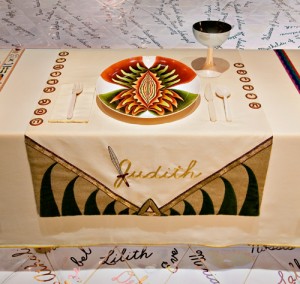Women Have a Seat at the Table. But Wait. Who's Clearing? (Ahem, Men)

Judy Chicago (American, b. 1939). The Dinner Party (Judith place setting). Elizabeth A. Sackler Center for Feminist Art, Brooklyn Museum of Art
It hasn’t worked for me. I’ve seen the YouTube clips, the greeting cards, the T-shirts. But the grand confluence of Thanksgiving and Chanukah that appears to have engrossed the entire Jewish world? (“It won’t happen for another 77,000 years! Wow!”) It just hasn’t connected for me.
Maybe it’s that Chanukah has already had to fight so hard to get attention next to it’s more typical yuletide December cousin. (Who needed another holiday to outshine Chanukah?) Or maybe it’s the historical discordance: Chanukah, after all, is a celebration of victory against foreign occupation, while Thanksgiving – one could argue – marks the beginning of a foreign occupation. Whatever the reason, I’ve just had no enthusiasm for cranberry-topped latkes or Manischewitz-brined turkey.
Call me “The Grinch Who Stole Thanksgivukkah.” Oh wait, that’s pretty much been done, too.
But then an important connection occurred to me – about, of all things, gender roles. Start with Chanukah. The holiday is unusual in that it has few laws around it. Light some candles. Put them in a window. But when those candles are lit, we’re instructed by the authoritative Jewish law code, the Shulchan Aruch (Orach Chaim 670:1, to be exact), that women are not permitted to do any work. Other sources, like the 18th-century commentary Be’er Heitev, go further, freeing women from working until candles might be lit anywhere in town – that is, until midnight.
It was after all a woman, Judith, who was instrumental in defeating the powerful Greek general Holofernes. (Look it up, but make sure you’re on an empty stomach. It’s not pretty.) It makes sense to give women a rest from household toil. And maybe even to expand the ways we think about women engaging in the world, to think of women in arenas other than the kitchen or laundry room.
For an old-time religion like Judaism, it’s pretty revolutionary, no? Now, think about Thanksgiving celebrations you’ve been to. Do you remember women being freed from work? I don’t. In my childhood memory, Uncle Red shows off his considerable skill carving the turkey with an electric knife … while the women do literally everything else. Cooking, preparing, and presenting dinner, setting the table, and cleaning up afterward are burdens all shouldered overwhelmingly by women, while men congregate around a televised football game.
It seems to me that this happens even in families where women make crucial contributions to household finances. How many times have you been at a table of fully capable men, while women schlep platter after platter from the kitchen to the dining room?
The sad truth is that, even in Jewish communities that stand for egalitarianism on the pulpit and in the pews, gender-equality disappears in the home. Jews, of course, are not alone. A recent study by the Bureau of Labor Statistics reported that on an average day, 19 percent of men do housework such as cleaning or laundry, compared to 48 percent of women. And while 40 percent of men do food preparation or cleanup, almost 70 percent of women are engaged in the same activity. We’ve come a long way, baby. But we still have a long road left to travel.
So, in honor of Thanksgiuikkah, let us declare a sacred law for this holy day: men shall get off our butts, and give the women a rest. Actually help out in the kitchen and dining room. I know – this paradigm shift may be too overwhelming to even contemplate. So, fellow men, I invite you to start small. If your family is hosting, what parts of the meal preparation will you take on? If you are a guest, offer to help before the food is on the table. If a platter needs to be brought around the table, offer to do the heavy lifting. When a course comes to an end, bring your plate to the kitchen. Better yet, ask a woman if you can take her plate. Offer to do some dishes.
Who knows. You may even find that you want to do it again – maybe even before another 77,000 years pass.
Rabbi Michael Rothbaum serves as rabbi/educator at Beth Chaim Congregation in Danville, CA, and lives in Oakland with his partner, Yiddish singer Anthony Mordechai Tzvi Russell.
![[the current issue of ZEEK]](../../image/2/100/0/5/uploads/leftistethicistgraphic-52842c6a.png)
- 5000 Pages of Zeek
- Founded in 2001, Zeek was the first Jewish online magazine, and we have over 5000 pages online to prove it, all available free of charge. Read more in the Archive.
More articles by
- We're on Hiatus!
- Euphoria, Curiosity, Exile & the Ongoing Journey of a Hasidic Rebel: A Q & A with Shulem Deen
- Purim’s Power: Despite the Consequences –The Jewish Push for LGBT Rights, Part 3
- Love Sustains: How My Everyday Practices Make My Everyday Activism Possible
- Poet Q, Poet A: Jews Are Funny! Six Poets on Jewish Humor, Poetry & Activism and Survival
More articles in
Life and Action
- Purim’s Power: Despite the Consequences –The Jewish Push for LGBT Rights, Part 3
- Love Sustains: How My Everyday Practices Make My Everyday Activism Possible
- Ten Things You Should Know About ZEEK & Why We Need You Now
- A ZEEK Hanukkah Roundup: Act, Fry, Give, Sing, Laugh, Reflect, Plan Your Power, Read
- Call for Submissions! Write about Resistance!

